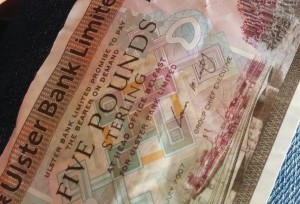After a recent trip to Northern Ireland I ended up with a Bank of Ulster five pound note. In N.I. a visitor needs to be careful which cash machin es they use. Some dish out Bank of England notes; others issue local banknotes. They have the same value, but try using an N.I. note in England and you’re out of luck: They’re rarely accepted.
es they use. Some dish out Bank of England notes; others issue local banknotes. They have the same value, but try using an N.I. note in England and you’re out of luck: They’re rarely accepted.
At uni, a Scottish friend would regularly get himself in a bit of a trouble by walking into shops (in Southampton) and trying to spend Scottish banknotes. On refusal, he would argue that they’re legal tender – so should be acceptable in England. He never got very far.
Now, with a banknote from Northern Ireland in hand, I wondered whether these notes are indeed valid for use in England.
It turns out that no, they’re not. As far as I can tell, legal tender is a very specific description which refers to the ability to use certain assets in repayment of debt. If you end up with a debt of some kind, you can use legal tender to settle the debt and the recipient (the debtor) cannot refuse.
With this in mind, my friend at the shop has two issues. First, there is no debt to settle. The shop can simply refuse to exchange the goods for the money so any legal tender argument is irrelevant, since there’s no debt. They can easily turn him away.
Restaurants are a slightly different matter. If you eat your meal then pay afterwards, a debt has been created (you certainly owe them for the meal) so my understanding is they would be obliged to accept legal tender.
On to the second point. Scottish banknotes won’t work anyway since they’re not legal tender in England. In fact, it turns out they’re not even legal tender in Scotland. There are specific combinations of coins and notes which are valid in each country:
In Scotland, only coins are valid legal tender. Scottish banknotes have no legal tender status anywhere. As far as I can tell, this is also true for N.I.-issued notes.
In England and Wales, banknotes issued by the Bank of England are legal tender (provided they’re current – old notes are no longer valid). You can settle any debt with banknotes.
Coins are legal tender throughout the whole United Kingdom, although there are restrictions. You can only settle a debt up to £5 if you only have 10p coins, for instance.
Legal tender is a very specific definition, and seems to be the subject of misunderstanding. My Bank of Ulster five pound note means very little in England, but the novelty of having it hasn’t worn off yet, so I’ll be keeping it for now.
As always, I am not a lawyer, currency expert or accountant so check with a pro before you attempt to settle your debts…